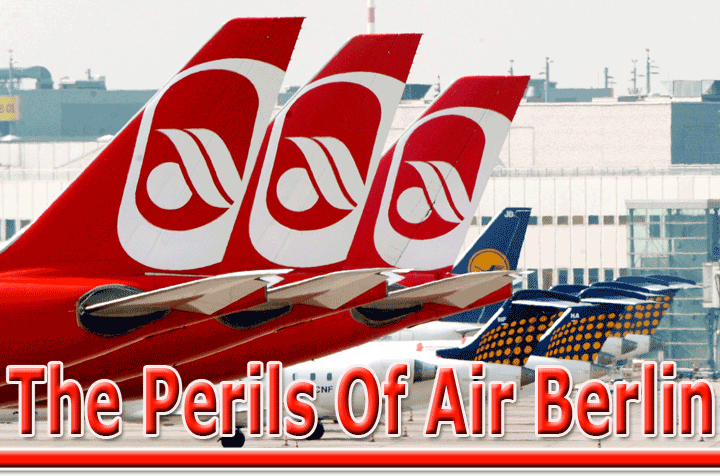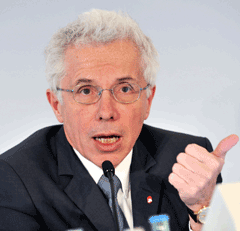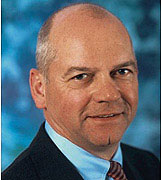| 
 Back
in the silent film era, the transportation equivalent of impending doom
was depicted in the movie series Perils of Pauline, when a “damsel
in distress” was tied to a railroad track as a train approached. Back
in the silent film era, the transportation equivalent of impending doom
was depicted in the movie series Perils of Pauline, when a “damsel
in distress” was tied to a railroad track as a train approached.
Fast forward to 2014, as Air Berlin (AB)
faces its own peril, and this time—despite tons of money and political
clout—the airline and its “white knight” and bailout
source Etihad Airways may be running out of options.
Just a few days ago, Wolfgang Prock-Schauer,
the CEO of AB who was tasked with leading the turnaround of AB after taking
over from former controversial CEO Hartmut Mehdorn, announced that he
would step down on January 31st.
Stefan Pichler, a former LH rank-and-file
manager who recently headed Fiji Airlines, will succeed Prock-Schauer.
Prock-Schauer, an airline buff with an immaculate
track record who served as Lufthansa’s troubleshooter at lossmaking
British acquisition BMI, as well as in a similar function at India’s
Jet Airways (9W), has a reputation for being a fact-based, hands-on leader.
But his abrupt departure could indicate
that he either does not believe in a successful turnaround of AB or that
Etihad Airways (EY), the only lifeline left to AB, prefers someone else
implement an entirely different business plan.
The latter seems unlikely given Prock-Schauer’s
reported “good relationship” with EY CEO James Hogan.
AB
Registered In UK, & Other Factoids
 Although Air Berlin is advertised as a “German” carrier and
bears the German capital in its name, AB has been headquartered in Rickmansworth,
United Kingdom since 2006, reportedly for tax reasons.
Although Air Berlin is advertised as a “German” carrier and
bears the German capital in its name, AB has been headquartered in Rickmansworth,
United Kingdom since 2006, reportedly for tax reasons.
Looking back, AB was formed by former CEO
Joachim Hunold (right) by integrating former German holiday carrier LTU,
Deutsche BA (The German subsidiary of British Airways), the Austrian NIKI,
and the Swiss Belair.
Founded in 1978 by U.S. citizen Kim Lundgren,
at one time AB was headquartered in Miami, as prior to German reunification
and the ending of allied air traffic restrictions in 1990, only aircraft
registered in one of the allied states were permitted to operate to and
from Berlin.
In 1991, when Joachim Hunold took over,
the registry was moved to Germany and the business model changed entirely.
While the focus on nearby sun destinations
such as the ever-popular Palma de Mallorca (PMI) paid off, mounting debts
proved to be a heavy burden for AB, which Hunold tried to overcome by
further expansion. Attempts to take over German holiday carrier Condor
(DE) in 2007 and Germania (ST) in 2008 failed.
What emerged were various attempts to expand
AB, with the net impact of creating an airline that was neither a full-fledged
legacy carrier such as Lufthansa, or a charter or holiday carrier such
as SunExpress (XQ) or Condor (DE).
To keep afloat, Air Berlin resorted to measures
that usually announce the end for most airline businesses, including selling
off assets, outsourcing, and other activities, prompting a remark by an
industry observer that the AB business plan resembled the airline equivalent
of “a Ponzi scheme.”
Enter Etihad
Air Berlin divested themselves of aircraft,
buildings, ULDs, and even spare engines and crew uniforms.
The knight in shining armor arrived in December
2011, when EY upped their share from 2.99 percent to 29.21 percent at
a cost of 73 million Euros (93 million USD) .
In March 2012, AB joined Oneworld and thus
gained access to additional routes and destinations of the Oneworld partners.
But the cutbacks in staff and systems by
now had taken a toll as AB had developed a notorious reputation for not
dealing with customer complaints and inquiries.
With load factors dwindling despite Oneworld,
AB relinquished routes and reduced network, staff, and fleet, selling
the AB frequent flyer program called “TopBonus” to EY for
184 Million Euros (234.5 million US$) in December 2012.
30,000
Complaints
An upshot of all of this came forward in 2013,
when the German business daily HANDELSBLATT and the daily WELT reported
that more than 30,000 complaints at AB were unresolved and that many were
closed without any response to the customers.
Latest
Numbers
After AB’s 2013 earnings report, which
had been pushed back a number of times, was finally published on April
28th, 2014, with an all-time record loss of 314.5 million Euros (400.8
million US$), AB’s bankruptcy was avoided by Etihad, which provided
another third-tier convertible bond totaling 300 million Euros (383 million
US$).
Although it rescued AB from immediate doom,
this EY bailout woke up the German air transport watchdog, LBA, to finally
question the financial standing of AB and its business model.
The EY cash lifeline also understandably
drew some concern from Lufthansa, which saw these measures as an illegal
aid to a struggling competitor.
Bonds
Convert To Shares
The way these things work is that a 3rd tier
convertible bond gives the creditor the option to convert the loan into
shares at a given date.
However, EY cannot exercise this option,
as it would raise EY’s share beyond the 50 percent limit law on
foreign ownership, after which AB loses its European registry.
Similar doubts about the financial standing
of former Air Cargo Germany (6U) resulted in immediate revocation of ACG’s
operating permit on April 18th, 2013.
LBA Slams On The Brakes
LBA’s doubts about the validity of AB’s
business model materialized just last month in early October, when the
LBA refused to sign off on 34 EY/AB codeshare flights, which, according
to the LBA, “were not in accordance with the bilateral air services
agreement between Germany and the UAE.” Although
these codeshare flights had been approved during the previous six years,
the LBA insisted that there was no legal basis for further approval, likely
based on AB’s questionable financial standing and their rebuilt
business model as a feeder for EY and its subsidiaries.
But politics again held sway; the LBA decree
was overturned recently by German Minister for transport and infrastructure
Dobrindt, who ordered LBA to approve the code share flights in question.
Although the LBA has offered no further
comment, Minister Dobrindt indicated, “further bilateral talks are
underway which will resolve the issues at hand.”
While work apparently continues to figure
or finagle a fix that will stick, the word “unsustainable”
continues to bubble up whilst observing the “Perils of Air Berlin.”
Pauline, by the way, was bailed out from a nasty fate by her faithful
dog, who summoned a local hero and managed to get into the cab of the
locomotive, although apparently unlike Rin Tin Tin or Lassie could not
find anyone to translate canine.
Jens
 |
|





